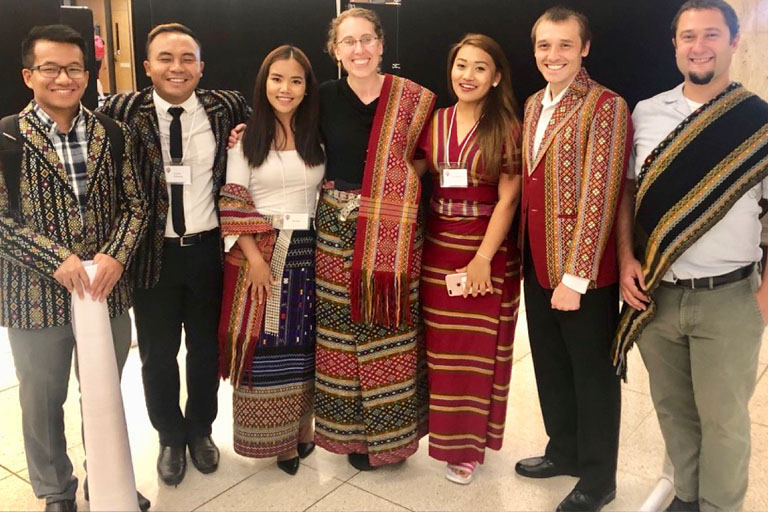As the COVID-19/Coronavirus outbreak continues to dominate the media, it is essential to have clear and accessible information on the disease. Many FAQs and fact sheets provided by organizations like the World Health Organization are available in a limited number of languages, however. On Monday, March 23, Governor Holcomb issued a Stay-At-Home order for Indiana, and his office posted a FAQ page only available in English, an example of how Hoosiers who cannot read English have difficulty accessing reliable information about the developing emergency.
One group who may be particularly affected by this lack of information is the more than 25,000 Burmese refugees who call Indiana home—19,000 of whom live in Indianapolis. Many people in the community come from Chin State in the western part of Burma/Myanmar. “People in Chin State tend to speak languages from the Kuki-Chin subgroup of the Tibeto-Burman language family,” Kelly Berkson, an assistant professor of Linguistics, said. “Our best guess is that there are between 30 and 50 Kuki-Chin languages spoken in Indianapolis. All of these languages are under-resourced. Many of them are completely undocumented, meaning that there is no work done on them whatsoever. Yet there are hundreds or thousands of speakers right here in Indiana, and materials related to critical topics like the COVID-19 pandemic are needed.”
Hakha Lai, also referred to as Hakha Chin or Laiholh, is the lingua franca (a language or dialect used for communication between groups who do not share a native language) in Chin State and Indianapolis. Many people in Chin State and Indianapolis are multilingual, but written materials from the WHO or the IN State Department of Health are generally unavailable in any Chin language. As such, Professor Berkson and her team of graduate linguistics students and IU undergraduates who are members of the Indianapolis Chin community work to identify high-need areas and translate necessary or critical information into Hakha Lai. Their group, called the Chin Languages Research Team, produces both scholarly and practical resources.
Before the COVID-19 outbreak, the team focused on census information. However, after the outbreak one of Berkson’s undergraduate students recommended pivoting towards COVID-19 information. The team jumped into action. “The last week has been a whirlwind,” said Berkson. While the undergraduates focused on translating and proofing each other’s work, Berkson and the graduate students have researched copyright laws to determine what materials can be translated and freely shared, built a website (chinlanguages.org), and worked on graphic design. The team has interfaced with community leaders, coordinated their efforts with community organizations, and devised social media strategies for sharing complete translations.
“This is new territory for all of us,” Berkson said. “The graduate students have never built a website. I have no experience with fund-raising, but I need to be able to support my students. The undergrads are translating materials into a language with no academic study on translation behind them. We’ve all faced a steep learning curve, but the project is so, so important. The pandemic is a scary time for everyone, especially for those in vulnerable communities. My students just want to help by providing their community members with critical information, both to prevent fear and so people know how to protect themselves.”
Due to the suddenness and scope of this project, Berkson requested funds from a variety of sources, including the Office of the Vice President for Diversity, Equity, and Multicultural Affairs (OVPDEMA) and the associate deans for the Arts and Humanities and Graduate Education and the Social and Historical Sciences, to pay her graduate students for their work.
“It can be difficult to get graduate student funding for this type of work,” Berkson said. “For most people, it’s easy to see why undergraduate students should receive funding. They are the ones with the linguistic knowledge, and they are community members. But there are a host of very practical tasks related to running and managing the project for which I need the graduate students’ help. It’s hard to fund because it’s not exactly research—but it’s crucial nevertheless, and the administration has been extremely responsive. We feel very fortunate to be a part of the IU community.”
The larger project provides a unique experience for Berkson’s undergraduate students, allowing them to gain firsthand experience with linguistic research. They serve as co-authors on presentations and papers, developing real-world knowledge about scholarship and the dissemination of findings. The novel coronavirus information translation project has provided invaluable learning opportunities, as well. For example, the students were able to participate in a 2-hour Zoom session with a professional translator from the community. “Translation is difficult,” Berkson said. “Some of the technical terms are unfamiliar even for English speakers, and it’s not always obvious how to translate them. The students got to work with and learn from an expert as they develop their skills, and that knowledge will serve them well in the future.”
When the Governor released the Stay-At-Home order on Monday, the team again sprang into action. They accessed the state’s FAQ page mid-afternoon and deployed their Hakha Lai version just after midnight. “The students are tireless,” Berkson said. “In a time of uncertainty, we get to work on something relevant and time-sensitive. It gives us all a sense of purpose. Who gets to do this? It’s a privilege.”
For available translated materials and information about other work, please visit their website chinlanguages.org.


